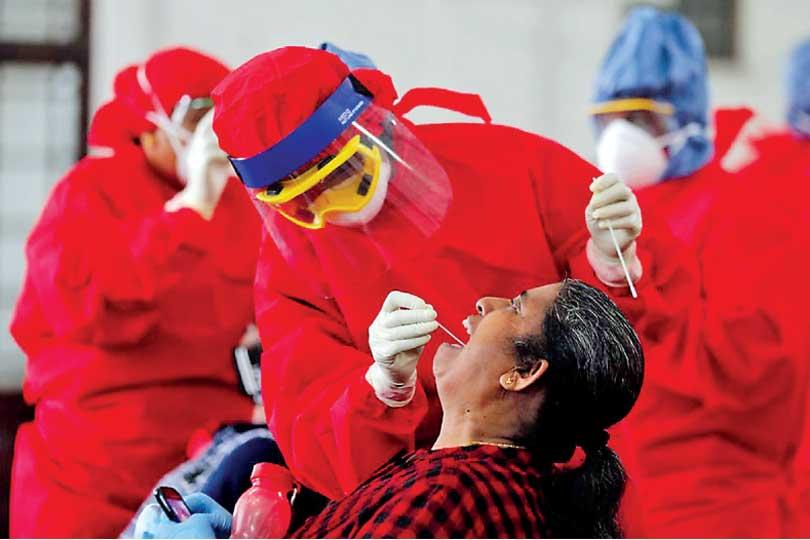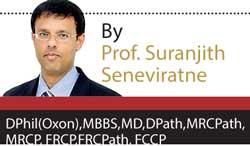Reply To:
Name - Reply Comment
Last Updated : 2024-04-26 13:57:00

Sri Lankan health officials take swab samples from employees of the Colombo municipal council to test for COVID-19 in Oct. last year. AP photo
 A virus is a microscopic infectious organism that can infect animals, plants, fungi and bacteria. They contain genetic material (either DNA or RNA) surrounded by a coat of protein, glycoprotein or lipid. Viruses do not contain the necessary components for making viral proteins and depend on the host cell for getting such a process completed. Viruses could be enveloped or non-enveloped. Their entry into animal cells is by attachment to specific receptors that allows it to fuse with or penetrate cell membranes. The virus reproduces after it infects a cell and produces more viral protein and genetic material.
A virus is a microscopic infectious organism that can infect animals, plants, fungi and bacteria. They contain genetic material (either DNA or RNA) surrounded by a coat of protein, glycoprotein or lipid. Viruses do not contain the necessary components for making viral proteins and depend on the host cell for getting such a process completed. Viruses could be enveloped or non-enveloped. Their entry into animal cells is by attachment to specific receptors that allows it to fuse with or penetrate cell membranes. The virus reproduces after it infects a cell and produces more viral protein and genetic material.
Mutations arise during virus reproduction. A mutation refers to the actual change in the genetic sequence of the virus. Viruses adapt to their hosts as they reproduce and mutations are a natural part of virus evolution. RNA viruses (e.g. influenza, dengue, HIV, hepatitis C, rabies, and measles) have a higher mutation rate than DNA viruses (herpes, papilloma). As RNA viruses employ an intrinsically error-prone RNA polymerase for replication, their genomes will accumulate mutations during each cycle. Most of the mutations have no impact on the behaviour of the virus. Sometimes a mutation or combination of mutations may provide the virus with a new advantage. One or more mutations would produce a viral variant.
Mutations arise during virus reproduction. A mutation refers to the actual change in the genetic sequence of the virus. Viruses adapt to their hosts as they reproduce and mutations are a natural part of virus evolution
Coronavirus Disease 2019 (COVID-19) is caused by Severe acute respiratory syndrome coronavirus 2 (SARS-CoV-2). This virus originated in Wuhan, China in December 2019. It is currently pandemic, and as of January 10, 2021, there have been around 90 million cases worldwide and over 1.9 million deaths. Human coronaviruses were discovered in the 1960’s and seven strains may cause disease. Human coronavirus OC43 (HCoV-OC43), Human coronavirus HKU1 (HCoV-HKU1), Human coronavirus 229E (HCoV-229E) and Human coronavirus NL63 (HCoV-NL63) cause mild disease, whilst the Severe acute respiratory syndrome coronavirus (SARS-CoV-1), Middle East respiratory syndrome-related coronavirus (MERS-CoV), and Severe acute respiratory syndrome coronavirus 2 (SARS-CoV-2) may potentially cause severe disease. SARS-CoV-2 and SARS-CoV-1 have high degrees of genomic similarity and use angiotens in converting enzyme 2 (ACE2) as an entry receptor. The spike protein on SARS-CoV-2 binds (via the Receptor Binding Motif – RBM) to the ACE receptor on host cells.
Mutations in SARS-CoV-2
Mutations would arise naturally in the SARS-CoV-2 genome as it circulates in human populations. Many thousands of mutations have already arisen in the SARS-CoV-2 genome since the virus was first reported. Most of the observed mutations have no apparent effect on the virus. Only a very small number are likely to be important and would change the virus in any important way. Presently, most attention is on mutations in the gene that encodes the Spike protein (which is associated with viral entry into cells) and around 4000 mutations have been found. A small number of mutations are in a region referred to as the RBM of the Spike protein. During the first wave of the COVID-19 pandemic, mutations were studied in over 50,000 SARS-CoV-2 viral genomes. None of the detected mutations were able to significantly change the ability of the virus to survive or reproduce. That is it did not affect viral fitness. Some of the better known mutations in the SARS-CoV-2 virus are given below:
D614G mutation
The aminoacid Aspartic acid (D) is replaced by glycine (G) at position 614. This variant was first detected in late January/early February 2020 and then reached global dominance a few months later. On studying >25,000 SARS-CoV-2 genome sequences form the UK, it was observed that the 614G variant spread faster. More efficient transmission of this variant was then confirmed in two animal models. Very recently the variant has been shown to have an increased susceptibility to neutralisation by serum from immune or vaccinated persons.
N453Y mutation
Here the aminoacid Asparagine at position 453 is replaced by Tyrosine. This was observed in Mink farms in Denmark and the Netherlands in late spring and early summer of 2020.
During the first wave of the COVID-19 pandemic, mutations were studied in over 50,000 SARS-CoV-2 viral genomes. None of the detected mutations were able to significantly change the ability of the virus to survive or reproduce
Cluster 5 variant
Eleven persons were reported from Denmark with this variant. In addition to a Y453F alteration, other changes were also noted in the spike protein gene (including the deletion, del 69_70). This finding was taken seriously as there was a moderate reduction in neutralisation of the variant virus by serum from immune persons. Large numbers of mink were culled with the aim of bringing this situation under control.
New variant of SARS-CoV-2 in the UK (B.1.1.7)
This is referred to as VOC–202012/01 or lineage B.1.1.7. It carries at least 24 mutations (including 14 defining ‘non-synonymous’ mutations – which is a relatively large number of changes). Seven of these changes are in the spike protein gene. Many of the mutations in the new variant have been observed individually in SARS-CoV-2 in the past. Some occurred quite early in the pandemic. The new variant is characterised by a combination of mutations.
N501Y mutation
This was first detected in a SARS-CoV-2 virus in Brazil in April 2020. The N501Y mutation has previously been shown to increase binding of the virus to ACE2 receptors.
Del 69_70 and other deletions
Some of the deletions identified in B.1.1.7 have also been previously observed in other lineages of the virus.
The UK new variant was first announced by the UK Health and Social Care Secretary on December 14, 2020. Previous sequencing information found the first positive sample for this variant to be from Kent in September 2020. The variant is now found across the UK and has been noted in more than 30 other countries (including Denmark, Netherlands, Belgium, Australia and the USA). Scientists are uncertain how this variant arose, but similar patterns of mutation have been observed in chronically infected patients with weaker immune systems. It is possible that chronic infection, in a single immuno-compromised individual may have led to the origin of this variant.
The UK new variant is more transmissible. Its transmission increased massively in London and the South East of England during November 2020. Studies suggest the new variant increased the R number by between 0.4 and 0.7. The R number is the average number of people an infected person infects. If it is above 1, the pandemic is growing. Current findings indicate this new variant does not to affect disease severity and that the presently approved vaccines would be effective against it. Vaccines stimulate a broad antibody response to the entire spike protein and also a cellular immune response. Thus it is anticipated that their efficacy would not be significantly affected by some of the mutations.
New variant of SARS-CoV-2 in South Africa (501Y.V2)
This variant emerged independently in South Africa and was reported on December 18, 2020. It was first seen in the Eastern and Western Cape of South Africa and is a different virus variant to that found in the UK. More than six countries have reported cases with this variant and it is associated with increased viral load and transmissibility. The mutation E484K (the where the amino acid Glutamic acid is replaced by Lysine) is under careful scrutiny, as initial laboratory studies appears to suggest this change may make a person’s antibodies less effective at neutralising the virus.
Conclusion
Genomic surveillance in some countries is much higher than others. It is thus possible that the reported findings do not reflect the true distribution of the new variants. They may exist undetected elsewhere. Multiple studies on the functional effect of the mutations and deletions on disease transmissibility, severity and vaccine effectiveness are ongoing. Extensive genome sequencing, data sharing, and standardised reporting of variants would help identify the effects of new variants as they arise.
The writer is a Professor and Consultant in Clinical Immunology and Allergy at the Institute of Immunity and Transplantation and Health Services Laboratories, London, UK
SAMITHA JAYANGA Tuesday, 12 January 2021 10:00 PM
Great article professor . Thank you and all the best

Add comment
Comments will be edited (grammar, spelling and slang) and authorized at the discretion of Daily Mirror online. The website also has the right not to publish selected comments.
Reply To:
Name - Reply Comment
US authorities are currently reviewing the manifest of every cargo aboard MV
On March 26, a couple arriving from Thailand was arrested with 88 live animal
According to villagers from Naula-Moragolla out of 105 families 80 can afford
Is the situation in Sri Lanka so grim that locals harbour hope that they coul